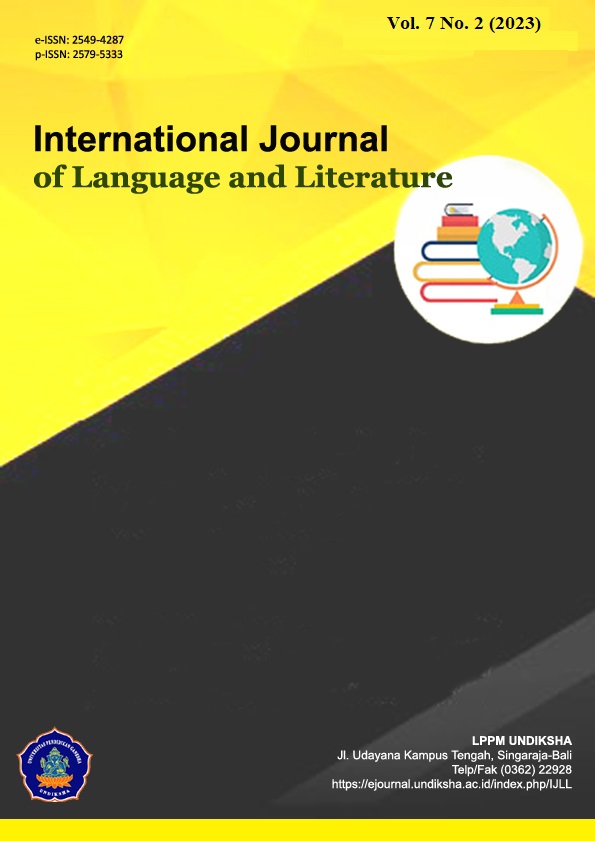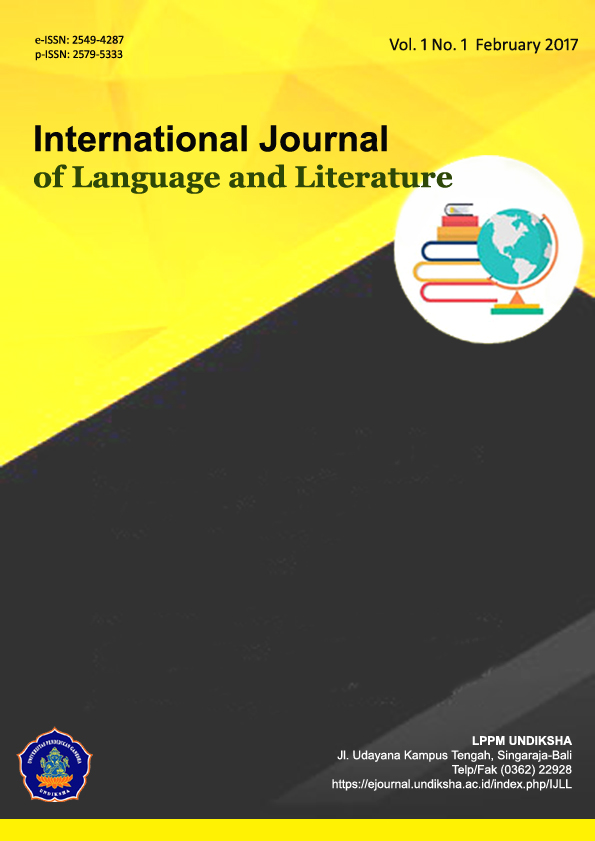An Analysis of Students’ Grammatical Errors in Writing Narrative Texts
DOI:
https://doi.org/10.23887/ijll.v7i2.29453Keywords:
Grammatical Errors, Error Analysis, Narrative Texts.Abstract
Senior high school students still make a large number of errors related to grammar when they have writing narrative text. This study aimed to analyze the types of grammatical errors, identifying the sources of errors, and knowing the writing difficulties commonly faced by the tenth grade students of senior high school in their narrative texts. Descriptive qualitative method was used in this study. There were two kinds of data being used namely quantitative data and qualitative data. There were three different instruments applied such as, the teacher, writing test, and questionnaires. There were only 23 narrative texts collected and analyzed. Based on the error analysis, there were 308 grammatical errors classified into four types, namely ‘omission’, ‘misformation’, ‘addition’, and ‘misordering errors’ in students’ narrative texts. ‘Misformation errors’ are the biggest number of errors there were 131, the most dominant errors are ‘misformation of alternating form errors’. The errors occured because of the students’ interlingual and intralingual transfer. There were cognitive problem that made the students feel difficult in writing narrative texts because of their lack of knowledge of English grammar and vocabularies.
References
Al-Ta’ani, M. H. (2018). Integrative and Instrumental Motivations for Learning English as a University Requirement among Undergraduate Students at Al-Jazeera University/Dubai. International Journal of Learning and Development, 8(4), 89. https://doi.org/10.5296/ijld.v8i4.13940. DOI: https://doi.org/10.5296/ijld.v8i4.13940
Asfihana, R. (2021). Pre-service English Teachers’ Strategies in Incorporating Character Education during the Teaching Practice Program at UIN Antasari Banjarmasin. IJELTAL (Indonesian Journal of English Language Teaching and Applied Linguistics), 5(2), 309. https://doi.org/10.21093/ijeltal.v5i2.718. DOI: https://doi.org/10.21093/ijeltal.v5i2.718
Atmaca, Ÿ. (2016). Error Analysis of Turkish EFL Learners: A Case Study. Procedia - Social and Behavioral Sciences, 232, 234–241. https://doi.org/https://doi.org/10.1016/j.sbspro.2016.10.007. DOI: https://doi.org/10.1016/j.sbspro.2016.10.007
Awada, G., & Plana, M. G. C. (2018). Multiple strategies approach and EFL reading comprehension of learners with dyslexia: Teachers’ perceptions. International Journal of Instruction, 11(3), 463–476. https://doi.org/10.12973/iji.2018.11332a. DOI: https://doi.org/10.12973/iji.2018.11332a
Bakoko, R., & Pratiwi, D. I. (2021). The application of cooperative principle in learning spoken English. International Journal of Education and Language, 1(1), 1–10. https://doi.org/10.5349/ijel.v1i01.
Başar, S. (2020). Teacher Cognition in Grammar Teaching: A Case Study in a Turkish EFL Context. International Journal of Modern Education Studies, 4(2), 57. https://doi.org/10.51383/ijonmes.2020.51. DOI: https://doi.org/10.51383/ijonmes.2020.51
Blangsinga, G. W. K. A. A., Suwastini, N. K. A., Lasmawan, I. W., Adnyani, N. L. P. S., & Rusnalasari, Z. D. (2021). Patriarchal binary oppositions in narrative texts included in English textbook for senior high school in Indonesia. 2nd International Conference on Technology and Educational Science (ICTES 2020), 135–141. https://doi.org/https://dx.doi.org/10.2991/assehr.k.210407.227. DOI: https://doi.org/10.2991/assehr.k.210407.227
Castillo-Cuesta, L. (2022). Using Genially Games for Enhancing EFL Reading and Writing Skills in Online Education. International Journal of Learning, Teaching and Educational Research, 21(1), 340–354. https://doi.org/10.26803/ijlter.21.1.19. DOI: https://doi.org/10.26803/ijlter.21.1.19
Cresswell, J. W., & Cresswell, J. D. (2018). Research Design; Fifth Edition.
Dewi, F. S., & Huda, M. C. (2020). An Analysis of Students ’ Errors in Writing Descriptive Text at Tenth Grade of SMAN 1 Tulungagung in Academic Year 2018 / 2019. A Journal of English Language Teaching, Linguistics, and Literature, 3(1), 11–20. https://www.academia.edu/download/87227928/1544-3105-2-PB.pdf.
Durga, Sri, S., & Rao, C. S. (2018). Developing Students’ Writing Skills in English-A Process Approach. Journal for Research Scholars and Professionals of English Language Teaching, 2(6), 1–5. https://www.researchgate.net/profile/V-Chandra-Rao/publication/325489625.
Feng, Z. (2014). Using teacher questions to enhance EFL students’ critical thinking ability. Journal of Curriculum and Teaching, 2(2), 147–153. https://doi.org/10.5430/jct.v2n2p147. DOI: https://doi.org/10.5430/jct.v2n2p147
Friantary, H., Afriani, Z. L., & Nopitasari, Y. (2020). The Implementation of Indonesian Language Learning for Dyslexic in Children at Elementary Schools in Bengkulu. Linguists : Journal Of Linguistics and Language Teaching, 6(2), 23. https://doi.org/10.29300/ling.v6i2.3750. DOI: https://doi.org/10.29300/ling.v6i2.3750
Georgieva, S. (2019). The role of feedback when training pre-service native language teachers. V International Forum on Teacher Education, 1, 323–337. https://doi.org/10.3897/ap.1.e0196. DOI: https://doi.org/10.3897/ap.1.e0196
Hashim, H. U., & Yunus, M. M. (2018). English as a Second Language (ESL) Learning: Setting the Right Environment for Second Language Acquisition. Tadris: Jurnal Keguruan Dan Ilmu Tarbiyah, 3(2), 207. https://doi.org/10.24042/tadris.v3i2.2941. DOI: https://doi.org/10.24042/tadris.v3i2.2941
Hashim, H. U., Yunus, M. M., & Hashim, H. (2018). Language learning strategies used by adult learners of teaching english as a second language (tesl). TESOL International Journal, 13(4), 39–48. https://eric.ed.gov/?id=EJ1244116.
Hawkyard, R., Dempsey, I., & Arthur-Kelly, M. (2014). The handwriting experiences of left-handed primary school students in a digital age: Australian data and critique. Australian Journal of Education, 58(2), 123–138. https://doi.org/10.1177/0004944114530062. DOI: https://doi.org/10.1177/0004944114530062
I.G.S. Darma, N.N. Padmadewi, & D.P. Ramendra. (2021). A Using Edmodo as Scaffolding Technique in SMK Masudirini for 10th Grade Students on Teaching Writing Skill in Academic Year 2019/2020. Jurnal Pendidikan Bahasa Inggris Indonesia, 9(1), 32–36. https://doi.org/10.23887/jpbi.v9i1.257. DOI: https://doi.org/10.23887/jpbi.v9i1.257
Islamiyah, M., & Fajri, M. S. Al. (2019). Error Analysis and Its Implications for the English Classroom : A Case Study of an Advanced English Learner. Indonesian EFL Journal: Journal of ELT, Linguistics, and Literature, 5(2), 1–13. http://ejournal.kopertais4.or.id/mataraman/index.php/efi/article/view/3736.
Manik, N. P. I. M. C., & Suwastini, N. K. A. (2020). Analyzing grammatical error in students’ recount text writing in junior high school. Humanis, 24(3), 238–246. https://doi.org/10.24843/jh.2020.v24.i03.p02. DOI: https://doi.org/10.24843/JH.2020.v24.i03.p02
Megawati, F., & Anugerahwati, M. (2012). Comic strips: a study on the teaching of writing narrative texts to , . Indonesian EFL Students. Teflin Journal, 23(2), 183–205. https://doi.org/10.15639/teflinjournal.v23i2/183-205.
Menbet, A. A. (2018). The Use of Effective Strategies to Improve Saudi EFL Dyslexic Learners’ Writing Skills. Theory and Practice in Language Studies, 8(12), 1611. https://doi.org/10.17507/tpls.0812.06. DOI: https://doi.org/10.17507/tpls.0812.06
Mukhsinah, A. F. (2020). The Use of E-Portfolio Assessment To Improve Students ’ Writing. RETAIN, 8(2), 164–170. https://www.researchgate.net/profile.
Munawaroh, S. (2019). Teaching the narrative texts using animation video: raising students’ skills on reading comprehension. Utamax : Journal of Ultimate Research and Trends in Education, 1(1), 18–22. https://doi.org/10.31849/utamax.v1i1.2791. DOI: https://doi.org/10.31849/utamax.v1i1.2791
Mustadi, A., & Amalia, M. (2020). Spelling Writing Error Analysis in Nonfiction Essay of Elementary Students. Jurnal Prima Edukasia, 8(2), 177–187. https://doi.org/10.21831/jpe.v8i2.33436. DOI: https://doi.org/10.21831/jpe.v8i2.33436
Nassaji, H. (2015). Qualitative and descriptive research: Data type versus data analysis. Language Teaching Research, 19(2), 129–132. https://doi.org/10.1177/1362168815572747. DOI: https://doi.org/10.1177/1362168815572747
Nishanthi, R. (2018). The importance of learning English in today world. International Journal of Trend in Scientific Research and Development, Volume-3(Issue-1), 871–874. https://doi.org/10.31142/ijtsrd19061. DOI: https://doi.org/10.31142/ijtsrd19061
Pasaribu, A. N. (2021). A Common Error Analysis in Students’ English Narrative Writing. English Education and Art (LEEA) Journal, 4(2), 436–445. https://doi.org/10.31539/leea.v4i2.2338. DOI: https://doi.org/10.31539/leea.v4i2.2338
Permatasari, A. D., Wijayatiningsih, T. D., & Mulyadi, D. (2018). Error Analysis on EFL Learners’ Analytical Exposition Writing. Surakarta English and Literature Journal, 1(1), 22–30. https://doi.org/10.52429/selju.v1i1.204. DOI: https://doi.org/10.52429/selju.v1i1.204
Pratiwi, K. D. (2016). Students ’ difficulties in writing English : A study at the third semester students of English education program At University of Bengkulu. E Journal Universitas Bengkulu, 1(2), 1–13. https://doi.org/10.29300/ling.v3i1.106.
Sukandi, S. S., & Syafar, D. N. (2018). EFL students’ responses to learning basic reading and writing skills. Studies in English Language and Education, 5(1), 40–53. https://doi.org/10.24815/siele.v5i1.8419. DOI: https://doi.org/10.24815/siele.v5i1.8419
Suryanto, & Sari, Z. E. (2021). Difficulties and Strategies in Learning English: An Analysis of Students From English and Non-English Education Department in Indonesia. 518(ICoSIHESS 2020), 313–331. https://doi.org/10.2991/assehr.k.210120.140. DOI: https://doi.org/10.2991/assehr.k.210120.140
Thi Ngoc Nguyen, C., & Nguyen, T. T. (2020). Non-Language-Major Students’ Autonomy in Learning English in Vietnam. Arab World English Journal, 11(3), 184–192. https://doi.org/10.24093/awej/vol11no3.11. DOI: https://doi.org/10.24093/awej/vol11no3.11
Wang, & Zhong. (2021). Research and Implementation of English Grammar Check and Error Correction Based on Deep Learning. Hindawi Scietific Programming, 1-10. https://doi.org//10.1155/2022/4082082. DOI: https://doi.org/10.1155/2022/4082082
Widyaningrum, H. K., & Hasanudin, C. (2019). Kajian Kesulitan Belajar Membaca Menulis Permulaan (MMP) di Sekolah Dasar. Pedagogia : Jurnal Pendidikan, 8(2), 189–199. https://doi.org/10.21070/pedagogia.v8i2.2219. DOI: https://doi.org/10.21070/pedagogia.v8i2.2219
Yoandita, P. E. (2019). An Analysis of Students’ Ability and Difficulties in Writing Descriptive Text. Jurnal JOEPALLT (Journal of English Pedagogy, Linguistics, Literature, and Teaching), 7(1). https://doi.org/10.35194/jj.v7i1.534. DOI: https://doi.org/10.35194/jj.v7i1.534
Downloads
Published
How to Cite
Issue
Section
License
Copyright (c) 2023 International Journal of Language and Literature

This work is licensed under a Creative Commons Attribution-ShareAlike 4.0 International License.
IJLL Journal provides immediate open access to its content on the principle that making research freely available to the public to supports a greater global exchange of knowledge.

This work is licensed under a Creative Commons Attribution-ShareAlike 4.0 International License








